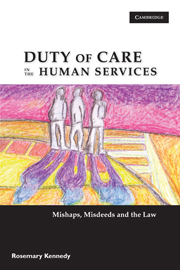Book contents
- Frontmatter
- Dedication
- Contents
- Acknowledgements
- Author's note
- Part 1 Positioning and mapping the territory of human service mishaps and misdeeds
- Part 2 Mishaps and misdeeds through a law lens
- Part 3 Mishaps and misdeeds through a human services lens
- Chapter 9 Service delivery – screening, assessment and planning
- Chapter 10 Service delivery – implementation and closure
- Chapter 11 Information and records management
- Chapter 12 Relationships, rifts and reactions
- Part 4 Mishaps and misdeeds through a unified lens
- Appendix: Finding the law and cases
- References
- Index
Chapter 9 - Service delivery – screening, assessment and planning
from Part 3 - Mishaps and misdeeds through a human services lens
Published online by Cambridge University Press: 05 June 2012
- Frontmatter
- Dedication
- Contents
- Acknowledgements
- Author's note
- Part 1 Positioning and mapping the territory of human service mishaps and misdeeds
- Part 2 Mishaps and misdeeds through a law lens
- Part 3 Mishaps and misdeeds through a human services lens
- Chapter 9 Service delivery – screening, assessment and planning
- Chapter 10 Service delivery – implementation and closure
- Chapter 11 Information and records management
- Chapter 12 Relationships, rifts and reactions
- Part 4 Mishaps and misdeeds through a unified lens
- Appendix: Finding the law and cases
- References
- Index
Summary
ON THE FIRST PAGE of the report, of the inquiry into Vivian Alvarez's unlawful removal from Australia to the Philippines in 2001, is the following finding: ‘On the basis of information Vivian provided, a social worker at the Richmond Clinic [psychiatric Unit] advised the Department of Immigration and Multicultural and Indigenous Affairs (DIMIA) office in Southport…that Vivian might be an illegal immigrant’ (McMillan 2005 p. ix). Thereafter ensued a litany of ‘catastrophic’ (p. xv) and ‘systematic failures in DIMIA’ (p. xiii) which resulted in Ms Alvarez's ‘disappearance’ from Australia. Here is irrefutable evidence of the power and potential impact of the earliest presumptions and decisions, righty or wrongly made by human services agents in their interactions with those who enter their service networks.
The earliest phase of human services activity with potential clients involves a process of interpersonal engagement, information gathering and screening for agency–client fit or referral elsewhere. In this first contact, human services actors are ideally conducting a complex dual process; appraising the person in terms of service criteria and resources, while simultaneously and as objectively as possible observing behaviour and need, independent of agency demands. Workers' first appraisals are critical in determining much of what follows in the way of service activity. As Schön (1991) has so seminally argued, and others elaborated (eg Camilleri 1996; Gambrill 2006), the finding and framing of a problem is as important as any intervention intended to solve it.
- Type
- Chapter
- Information
- Duty of Care in the Human ServicesMishaps, Misdeeds and the Law, pp. 165 - 184Publisher: Cambridge University PressPrint publication year: 2009



